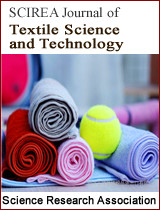EFFECT OF COMBINED CHEMICAL TREATMENT ON PHYSICAL, MECHANICAL AND CHEMICAL PROPERTIES OF POSIDONIA FIBER
DOI: 443 Downloads 6108 Views
Author(s)
Abstract
The aim of this study is to investigate the effect of chemical treatment method on the properties of Posidonia fibers. The chemical treatment which was carried out is a combined hydrogen peroxide and sodium hydroxide treatment. First, an investigation of the treatment processes was undertaken. Secondly, the physical properties (linear density, diameter and ratio length per diameter), the mechanical properties (tenacity, elongation) and chemical properties (FT-IR spectra and X ray diffraction) of posidonia fibers were investigated. The optimum operating conditions were indentified using a factorial design.
Keywords
Posidonia fiber, combined treatment, physical properties, mechanical properties, chemical properties.
Cite this paper
S. Zannen, L. Ghali, M.T. Halimi, M. Ben Hassen,
EFFECT OF COMBINED CHEMICAL TREATMENT ON PHYSICAL, MECHANICAL AND CHEMICAL PROPERTIES OF POSIDONIA FIBER
, SCIREA Journal of Textile Science and Technology.
Volume 1, Issue 1, October 2016 | PP. 1-19.
References
| [ 1 ] | Aguir, C (2010), Chemical modification of Posidonia with cyclic anhydrides: effect on thermal stability, Carbohydrate Research, 345 264–269. |
| [ 2 ] | Guala, I. (2006), Posidonia Oceanica ‘Banquette’ Removal: Environmental Impact and Management Implications. In: Proceedings of the Mediterranean Seagrass Workshop (Marsascala, Malta), Biologia Marina Mediterranea; 13, pp 149–153. |
| [ 3 ] | Ncibi, M.C. (2007), Kinetic and equilibrium studies of methylene blue biosorption by Posidonia oceanica (L.) fibres. J Hazard Mater; 139(2):280–5. |
| [ 4 ] | Khiari, R. (2010), Chemical composition and pulping of date palm rachis and Posidonia oceanica– a comparison with other wood and non-wood fibre sources. Bioresour Technol; 101:775–80. |
| [ 5 ] | Aguir, C. (2006), Experimental study on carboxymethylation of cellulose extracted from Posidonia oceanica. J Appl Polym Sci; 98:1808–16. |
| [ 6 ] | Khiari, R. (2011), New lignocellulosic fibres-reinforced composite materials: A step forward in the valorisation of the Posidonia oceanic balls, Composites Science and Technology 71, pp: 1867–1872. |
| [ 7 ] | Li, X. (2007), "Chemical Treatments of Natural Fiber for Use in Natural Fiber-Reinforced Composites: A Review," J. Polym. Env., vol. 15, pp. 25-33. |
| [ 8 ] | Yu Li, X. (2007), Surface modification and micromechanical properties of jute fiber mat reinforced polypropylene composites, eXPRESS Polymer Letters, Vol.1, No.5,pp: 299–307. |
| [ 9 ] | Rodriguez E.S., Stefani P.M. & Vazquez A. (2007), Effects of Fibers’Alk ali Treatment on the Resin Transfer Moulding Processing and Mechanical Properties of Jute-Vinylester Composites, Journal of Composite Materials, Vol. 41, No. 14. |
| [ 10 ] | Le Troedec M., Sedan D., Peyratout C., Bonnet J.P., Smith A., Guinebretiere R., Gloaguen V. & Krausz P. (2008), Influence of various chemical treatments on the composition and structure of hemp fibres, Composites- Part A: applied science and manufacturing, 39, 514-522. |
| [ 11 ] | Sgriccia N., Hawley M.C. & Misra M. (2008), Characterization of natural fiber surfaces and natural fiber composites, Composites- Part A: applied science and manufacturing, 39, 1632-1637. |
| [ 12 ] | Rowell R.M. (1998), Property Enhanced Natural Fiber Composite Material based on Chemical Modification, in Science and Technology of Polymers and Advanced Materials , Prasad P.N., Mark J.E., Kendil S.H. & Kafafi Z.H Eds., pag. 717-732, Plenum Press, New York. |
| [ 13 ] | Soo-Jin Park & Joong-Seong Jin (2001), Effect of Silane Coupling Agent on Interphase and Performance of Glass Fibers/ unsaturated Polyester Composites, Journal of Colloid and Interface Science,242, 174-179. |
| [ 14 ] | Li Hu, Yizao Wana, Fang He, H.L. Luo, Hui Liang, Xiaolei Li & Jiehua Wang (2009), Effect of coupling treatment on mechanical properties of bacterial cellulose nanofibrereinforced UPR ecocomposites, Materials Letters,63: 1952–195. |
| [ 15 ] | L. Ghali, S. Msahli, M. Zidi, F. Sakli, Effect of pre-treatment of Luffafibres on the structural properties, Materials Letters 63 (2009), pp: 61–63. |
| [ 16 ] | Boudouresque C.F., Meinesz A., 1982. Découverte de l’herbier de Posidonie. Cah. Parc nation. Port-Cros, Fr., 4: 1-79. |
| [ 17 ] | A.K. Bledzki, J. Gassan, « Composites reinforced with cellulose based fibres », Prog. Polym. Sci. 24 (1999) 221–274. |
| [ 18 ] | Ben Merzoug, I. (2011), Study of some Properties of the esparto Grass fiber waste (Alfa Fiber), Journal of Hazardous Materials 165, Volume 7, Issue 2, pp: 240–249. |
| [ 19 ] | Gomes, A. (2004), "Effects of alkali treatment to reinforcement on tensile properties of curaua fiber green composites," JSME International Journal Series A, vol. 47, pp. 541-546. |
| [ 20 ] | Cristaldi, G. (2010), Composites Based on Natural Fibre Fabrics, Woven Fabric Engineering, Polona Dobnik Dubrovski, ISBN 978-953-307-194-7. |
| [ 21 ] | Imen Maatouk, Slah Msahli, Mondher Zidi, and Faouzi Sakli, “Numerical simulation of yarn bending: statistical optimization”, International Journal of Applied Research on Textile, Volume 3, Issue 2, pp 49-59, December 2015. |
| [ 22 ] | Slah Msahli, Asma El Oudiani, Faouzi Sakli and Jean Yves Drean, Study of the “inter plant” variability in agave americana l. fiber properties”, International Journal of Applied Research on Textile, Volume 3, Issue 2, pp 1-14, December 2015. |
| [ 23 ] | Mounir Jaouadi, Slah M’sahli and Faouzi Sakli, “Optimization and Characterization of Pulp Extracted from the Agave Americana L. Fibers”, Textile Research Journal, Vol 79(2), pp: 110–120, 2009. |
| [ 24 ] | Adebajo, M.O. (2004), Infrared and 13C MAS nuclear magnetic resonance spectroscopic study of acetylation of cotton, Spectrochimica Acta, Part A: Molecular and Biomolecular Spectroscopy, 60(1-2): p. 449-453. |

